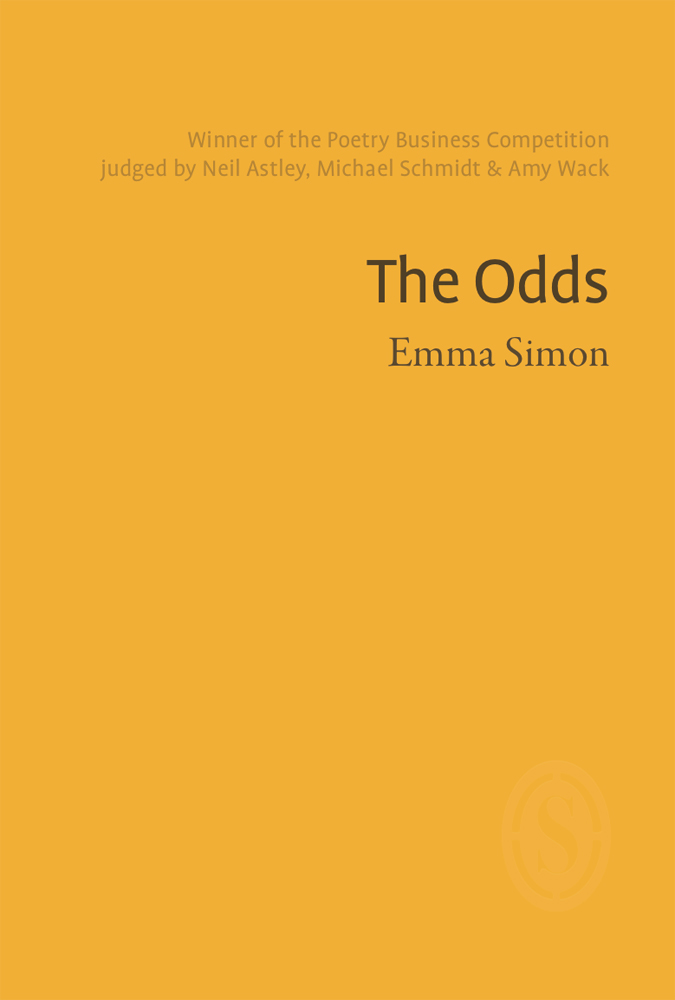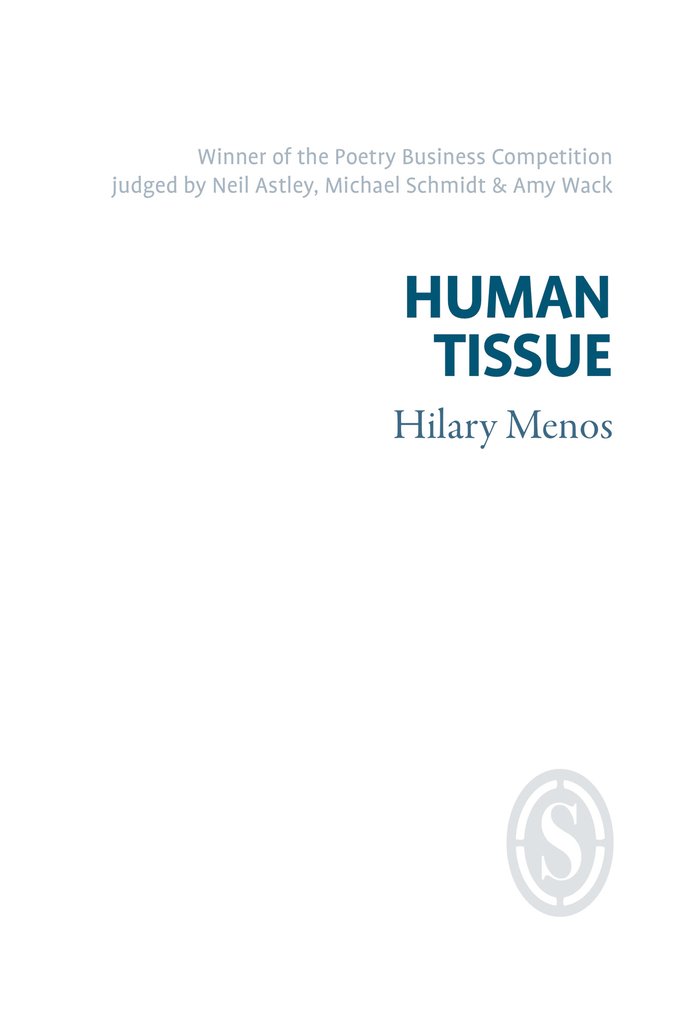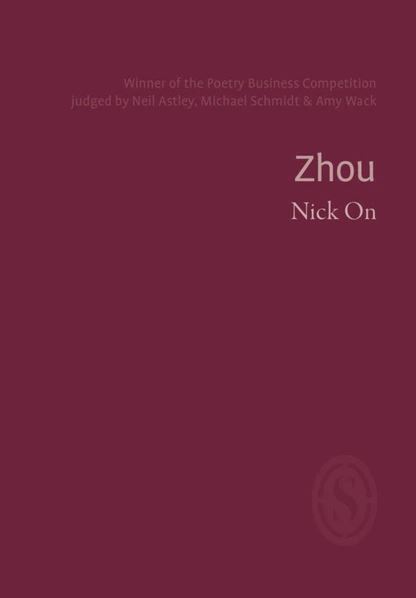The Poetry Business Competition has a great record of giving us exciting new work. These three winners – ranging from the accessible, witty, and moving poems of Emma Simon, through the powerful tale of a son’s kidney transplant in Hilary Menos’s Human Tissue to the intriguing new voice represented in Nick On’s Zhou – offer us a range of treasures.
In The Odds, Emma Simon follows her 2017 debut Dragonish (Emma Press) with another set of formally diverse poems. There is a sonnet written from the point of view of Lady Macbeth and another – from the point of view of a neglected fax machine – which somehow manages to become a quite moving meditation on the nature of existence and the passage of time. ‘Rummaging’ has some fun with the conventions of the villanelle, ‘Bad Feminists’ updates Robert Browning by way of David Beckham, and there is also ‘A Pindaric Ode to Robert Smith of The Cure’.
While Simon is capable of playful meditation on the nature of modern life in poems in touch with a world of ‘spare keys, nail scissors, MOT certificates’, one of the great things about these poems is the emotional depth they can reach. One of the pamphlet’s strongest poems, ‘Souvenirs’, begins startlingly:
Today is not the day you’re going to die. You watch a cat
stalk the shadow of a fly across the garage roof.
There’s real directness in this writing, a sense of drama: the poem wows and compels from the first sentence, exposing the knife-edge and the chasm-drop that lie just under the everyday, trivial things we do. I’m reminded of the much-anthologised Sheenagh Pugh poem ‘Sometimes’ here, in the ability to pin down enormous emotional concerns to concrete details – the cat, the garage roof. Having established that ‘these days are like the plates / your mother mounted on the kitchen wall’, the poem ends, perfectly poised, teetering dramatically on the brink:
And on days like this
you are again taken aback how they hold
the very idea of breaking, but still remain intact.
Another strong poem, ‘The Bookies’, a monologue written from the point of view of a woman working on the counter in the bookmakers, further illustrates the poet’s skill at observing modern life:
A man – it’s always a man – standing in front of me
mouthing the words thanks love through a fishbowl
while a symphony of hairdryers and hoovers whooshes
his words away.
This poem artfully manages the background noise of the bookmakers, ‘a white noise / looped on repeat through Saturday’s hubbub’, which recurs throughout the poem and gives a menacing undertone to everything the speaker observes going on around her. The poem shows great understanding of many things – gender politics, yearning – through its focus on all the concrete actions of the work:
We’re taught to count all winnings slowly, licked thumbs
peeling back the 50s. Turf accountants performing
our financial striptease, all eyes in the room on you, panting.
By focusing on the small concrete details of modern life, Simon is able to reach some incredibly important places in her poetry. Her ability to do so might remind us of the work of Kathryn Simmonds. Simon’s first full collection – surely hurtling towards us now – is going to be really something.
Someone who has already had a widely successful first collection, of course, is Hilary Menos. Winner of the Forward Prize for Best First Collection in 2010 with Berg (Seren), it is interesting that her pamphlet, Human Tissue, is a winner of this competition. The poems are of huge importance and accomplishment, but a question which might be worth raising is whether a competition like this, which has unearthed so many stunning new voices, should be the place for a writer who already has an established relationship with a publisher. The outlets for brand new poets are so limited.
The story of Human Tissue is told compellingly by Hugo Williams in his introductory note to the pamphlet:
Hilary Menos’s son Linus, who suffered from kidney failure, had
a “successful” transplant, aged 17, of one of his mother’s kidneys –
“successful” in that it took quickly and functioned well to start
with. What nobody told him about, or her, were the headaches,
the itching and the permanent shaking. Aged 19, Linus had a
massive rejection episode. They had to remove his mother’s
kidney and he is now on dialysis.
Menos’s writing in this pamphlet is of the greatest generosity, in terms of how significant this poetry could be to others undergoing a similar experience. Poetry needs nothing from such an experience beyond its clear and detailed recording. Williams’s own dialysis poems, of course, are brilliantly moving in part because they know this. Similarly, the poems in this pamphlet are at their most powerful when they are direct. ‘Danish Palaces Egg’ begins like this:
I conceive a space
the size of my fist
under my liver
or spleen
shielded by my diaphragm,
my spread ribs.
It holds your kidney
which I am keeping warm.
‘Admission’, similarly, records the dramatic process of going into hospital to have the kidney removed:
Lying on the hospital bed late at night
with the cannula in my arm starting to sting
and a bag shoving fluids into me at a rate
that tightens my wedding ring
I write a letter to you, at home with our son,
[…]
just in case anything goes wrong.
For all such treatment of heart-rending material, Human Tissue is not without its moments of humour and celebration. ‘Hats Off!’ is a well-turned sonnet in memory of Ronald Lee Herrick, the first person to donate a kidney:
whose twin brother Richard was dying of kidney disease,
who said, ‘I had heard of such things, but it seemed in the realm of science fiction’,
who was prepared to undergo a ‘mutilation procedure’
While this pamphlet is deeply moving in its individual poems and in the sweep of the narrative that builds across the sequence, I was less convinced by the series of poems which use the symbol of the ‘mud man’ as a kind of extended metaphor of the experience the speaker and her son are undergoing. This metaphor puts us at one remove from the reality of the events Menos is facing, resulting in poems that are more complicated and less powerful than when she is writing directly. From this point of view, it is unfortunate that the pamphlet begins with a ‘Mud Man’ poem:
The Mud Man squats in the copse,
his one long leg slung out like a telegraph pole.
From the back he looks like a minotaur having a massage.
From the side he looks like a bull with a bone in its mouth.
Once Human Tissue begins to deal directly with the experience the speaker and her son are facing, this pamphlet generates enormous power.
If Human Tissue gives us strong new work by an established name, Zhou presents a brand new voice in the previously unpublished Nick On. The pamphlet offers interesting, often moving reflections on family and heritage. ‘Copywriting’, for example, belongs to the father-at-work genre. The poem gives us a series of details of the father’s daily routine:
You shaved to Bach’s Badinerie,
a pleasantry, heard either side
of the hard high buzz of your Braun
and the pfuff pfuff of your breath blown
There is an emotional power in the simple recording of detail here, but for this reader the poem lacks that extra dimension to lift it towards the exciting or astonishing; it remains just another in that father-at-work genre. The children’s visit to the father’s workplace doesn’t quite do it, nor does the prosy summation of the ending, at exactly the point when we need lift-off:
Your whole career was filling space with words
making every quarter-page and half-page
articulate with copy.
‘Dr Wellington Koo’, on the other hand, is a playful technical accomplishment, which shows the poet’s ability to draw enormous resonance from a simple narrative. It begins like this:
Dr Wellington Koo
at an official do
during World War Two
sat next to
the Alderman’s wife.
The Alderman’s wife, in a moment of casual racism, asks Koo, ‘You like-y soup-y?’ After he has delivered ‘a speech / in perfect English’, Koo skewers the racism he has experienced, the playfulness of the well-managed form butting up wonderfully against the darkness of the subject:
In the pause
of the applause
he turned with cause
and opened his jaws:
‘You like-y speech-y?’
If this poem showcases the poet’s technical ability and a brilliant way with the short lyric, Zhou as a whole is dominated by some long poems and sequences – ‘Fragments of Zhou’, ‘Canto I’, ‘Canto II’ – which dwell on family and heritage. Long poems are a risk for a brand-new writer, as they ask a lot of a reader, but these poems show striking ambition and accomplishment. For this reader, the strongest of these sequences is ‘Ghosts’, which closes with a deeply moving reflection on fathers, sons, and inheritance:
Small habits of my father are now in my muscles.
My scowl, my stretch, my nodding show of interest
are his, as is the very cadence of my walk
[…]
this gesture I am making now
this clench of my mouth that pulses in my cheek,
is him, as it was, in him, his father.
Zhou, then, gives us a very promising new voice, adding to the richness of what this competition has gifted to us across many years. This crop of excellent pamphlets very much make us look forward to these writers’ future work, as well as to the future work generated by this vital competition.
Jonathan Edwards’s first collection of poems, My Family and Other Superheroes (Seren, 2014), received the Costa Poetry Award and the Wales Book of the Year People’s Choice Award. His second collection, Gen (Seren, 2018), also received the Wales Book of the Year People’s Choice Award. He lives in Crosskeys, South Wales, and is editor of Poetry Wales.

The Odds, Emma Simon

Human Tissue, Hilary Menos

Zhou, Nick On
Hi Jonathan, thanks for your review of Human Tissue. I’m interested that you feel the more personal poems are more powerful — I’m always aware of the danger of simply opening a vein onto the page, and I guess my Mud Man poems came out of the attempt to write at one remove from the direct experience. Sorry they didn’t convince you! Regarding whether established poets should enter the Poetry Business competition, there’s much to be said on both sides of the question but, as for me, I have no established relationship with any publisher — I moved to France in 2016 and Seren — understandably, in the current climate — want their poets to be able to promote and sell books in the UK. Tant pis. Best wishes, Hilary
[…] The Poetry Business Competition has a great record of giving us exciting new work, says Jonathan Edwards. These three winners – ranging from the accessible, witty, and moving poems of Emma Simon, through the powerful tale of a son’s kidney transplant in Hilary Menos’s Human Tissue to the intriguing new voice represented in Nick On’s Zhou – offer us a range of treasures. Read the Poetry School blogpost here. […]